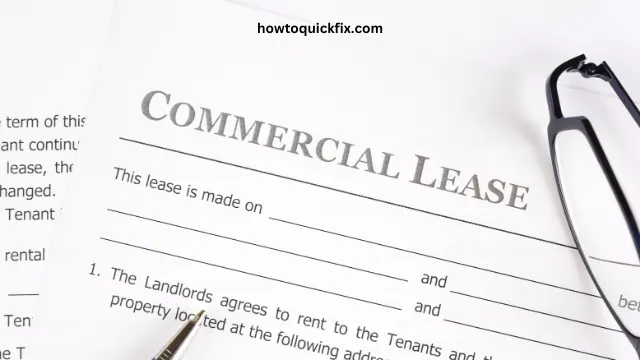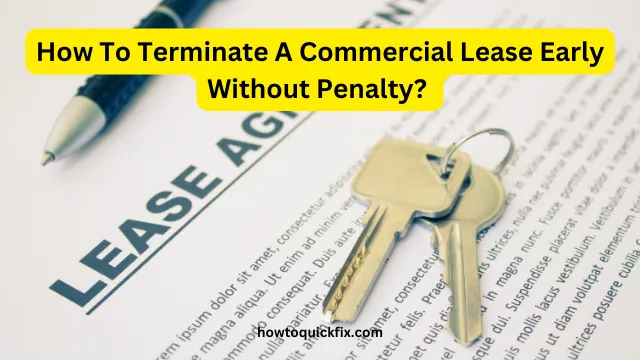Navigating the complexities of a commercial lease can feel like walking a tightrope, especially when circumstances force you to consider terminating it early. Whether you’re downsizing, relocating, or facing financial challenges, the stakes are high. Terminating a commercial lease without penalty can save you significant money, stress, and legal troubles.
For many business owners, a lease is one of the biggest financial commitments. Yet, life happens—markets shift, opportunities arise, or plans change. Understanding your options to exit a lease early without hefty penalties is not just smart—it’s essential. You don’t have to feel trapped by your lease agreement.
This blog post will guide you through the strategies and legal frameworks available for early lease termination. By empowering yourself with knowledge, you can protect your finances and reputation while making the best decision for your business. Let’s explore how to navigate this challenge with confidence and care.

Contents
- 1 1. Review the Lease Agreement Thoroughly
- 2 2. Negotiate with Your Landlord
- 3 3. Sublease or Assign the Lease
- 4 4. Explore Legal Justifications for Termination
- 5 5. Seek Professional Guidance
- 6 Conclusion:
- 7 FAQs:
- 7.1 What is an early termination clause?
- 7.2 Can I terminate a lease if my landlord violates the terms?
- 7.3 What is the difference between subleasing and assigning a lease?
- 7.4 How can I negotiate an early lease termination?
- 7.5 Do local laws protect commercial tenants?
- 7.6 Is professional help necessary for lease termination?
1. Review the Lease Agreement Thoroughly
Before taking any action, start by understanding the terms of your lease. Every lease agreement outlines the obligations of both the tenant and landlord, including early termination clauses.
Look for an “early termination clause” or “break clause.” These provisions often specify conditions under which you can end the lease without penalties. They may require advance notice or a fee, but understanding these terms is the first step.
Also, identify any “force majeure” clauses. These clauses may allow termination under extraordinary circumstances, such as natural disasters or economic disruptions. Knowing your agreement in detail helps you plan your next move effectively.
2. Negotiate with Your Landlord
Open communication with your landlord can make a significant difference. Landlords may be willing to negotiate early termination, especially if they can find a new tenant quickly.
Propose a mutually beneficial arrangement. You could offer to assist in finding a replacement tenant or cover some costs associated with re-leasing the property. This approach shows goodwill and can reduce potential conflicts.
Document all agreements in writing. A signed agreement ensures clarity and protects both parties, reducing the risk of disputes later. Negotiation often proves to be one of the most effective strategies for avoiding penalties.
3. Sublease or Assign the Lease
If your lease permits it, subleasing or assigning your lease to another party can be a practical solution. Subleasing allows another tenant to take over your space temporarily, while assignment transfers the lease entirely.
Ensure that the subtenant or assignee meets the landlord’s requirements. Most lease agreements require landlord approval for such arrangements. Providing a reliable candidate increases the chances of approval.
However, be aware of your ongoing liability. In many cases, the original tenant remains responsible if the new tenant fails to fulfill the lease terms. Ensure all details are clearly outlined in the sublease agreement.
4. Explore Legal Justifications for Termination
Certain legal grounds may allow you to terminate your lease without penalty. If the landlord has violated the lease terms, such as failing to maintain the property, you may have a case for early termination.
Research local laws to identify additional protections for tenants. In some jurisdictions, commercial tenants may have rights that support early termination under specific circumstances. Consulting a legal expert can clarify your options.
If your situation involves significant changes, such as zoning issues or health hazards, these may also justify early termination. Having legal documentation strengthens your case and protects you from liability.
5. Seek Professional Guidance
Terminating a commercial lease involves legal and financial complexities. Working with a real estate attorney or tenant advocate ensures you’re making informed decisions.
Professionals can help you interpret lease terms, negotiate with landlords, and explore alternative options. They also provide valuable insights into local regulations that may apply to your case.
Additionally, consider working with a commercial real estate broker. Brokers can assist in finding subtenants or negotiating lease buyouts, streamlining the process and reducing stress. Professional guidance is an investment in your peace of mind.
Conclusion:
Terminating a commercial lease early doesn’t have to be an overwhelming experience. By understanding your lease agreement, communicating openly with your landlord, and exploring creative solutions, you can exit without penalties and preserve your business’s stability.
While every lease is unique, the strategies outlined in this guide empower you to take control of the situation. From legal justifications to professional support, there are pathways to achieve your goal while minimizing risks. Acting proactively is the key to a smooth transition.
Your business deserves flexibility and resilience. With the right approach, you can turn a challenging lease situation into an opportunity for growth and focus on what matters most—your success.
FAQs:
What is an early termination clause?
An early termination clause allows tenants to end the lease under specific conditions, often requiring notice or fees outlined in the agreement.
Can I terminate a lease if my landlord violates the terms?
Yes, significant breaches like failing to maintain the property may provide legal grounds for termination. Consult a legal expert to confirm your rights.
What is the difference between subleasing and assigning a lease?
Subleasing involves temporarily renting the space to another tenant, while assignment transfers the lease entirely. Both options usually require landlord approval.
How can I negotiate an early lease termination?
Communicate openly with your landlord and propose a solution, such as helping find a new tenant or covering re-leasing costs. Written agreements are essential.
Do local laws protect commercial tenants?
In some areas, commercial tenants have legal protections that allow early termination under certain conditions. Research your local regulations or seek legal advice.
Is professional help necessary for lease termination?
While not mandatory, hiring a real estate attorney or broker can simplify the process and ensure compliance with legal requirements, saving you time and potential penalties.








